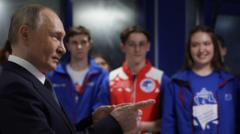**Putin's remarks at the Arctic Forum signal a shift in rhetoric toward the U.S., despite ongoing conflicts over Ukraine.**
**Putin Eyes Arctic Leadership Amid U.S. Greenland Aspirations**

**Putin Eyes Arctic Leadership Amid U.S. Greenland Aspirations**
**In Murmansk, the Russian President underscores geopolitical tensions while hinting at potential cooperation with the U.S.**
In an address at the Arctic Forum in Murmansk, the northernmost city in Russia, President Vladimir Putin articulated his ambition to fortify Russia's stance as a leader in the Arctic region, emphasizing the intensifying geopolitical rivalries at play. During his speech, he referenced former President Donald Trump's controversial proposal to buy Greenland, acknowledging the seriousness of U.S. intentions in the Arctic.
Putin stated, "America's plans regarding Greenland hold deep historical significance and are expected to be steadfastly pursued, aligning with their geo-strategic, military, and economic ambitions." Nevertheless, he refrained from criticizing Trump directly, suggesting a potential thaw in U.S.-Russia relations, which had become strained under President Joe Biden.
The Kremlin noted that discussions on economic cooperation, particularly regarding the Arctic's wealth of natural resources, could be fruitful. Kirill Dmitriev, Putin's envoy for foreign investment, expressed interest in collaborative efforts with American businesses and acknowledged ongoing talks with U.S. officials. "We are open to joint investments in approved sectors that benefit both countries," Dmitriev commented, while cautiously noting the need for a resolution to the Ukrainian conflict before any agreements could materialize.
Despite earlier mutual antagonism, U.S. rhetoric has shown signs of alignment with Russian perspectives, as well. Some American officials have echoed Kremlin viewpoints regarding Ukraine, particularly in informal discussions. Senior advisor Nikolai Patrushev remarked on the shift in U.S. political dynamics, suggesting that the Republican Party could foster new avenues for cooperation.
Patrushev remarked, "In the United States, there are competing parties with differing perspectives, which opens opportunities for dialogue." The former FSB head also spoke of a transitioning global order—shifting from a unipolar system to a multipolar one, a viewpoint shared by Russian leadership amidst current geopolitical turbulence.
At the same time, large-scale art installations, such as a giant inflatable whale in Murmansk, have drawn public interest, prompting conversations among residents about international cooperation. Opinions varied among locals, with some expressing support for collaboration with the U.S., while others remained uncertain about categorizing America as a "friendly country."
As diplomatic channels remain precarious, both nations are exploring potential partnerships, with Dmitriev particularly voicing admiration for American entrepreneur Elon Musk. He sees opportunities for collaboration in space-related endeavors, reflecting Russia's aspirations in both the Arctic and beyond.
Putin stated, "America's plans regarding Greenland hold deep historical significance and are expected to be steadfastly pursued, aligning with their geo-strategic, military, and economic ambitions." Nevertheless, he refrained from criticizing Trump directly, suggesting a potential thaw in U.S.-Russia relations, which had become strained under President Joe Biden.
The Kremlin noted that discussions on economic cooperation, particularly regarding the Arctic's wealth of natural resources, could be fruitful. Kirill Dmitriev, Putin's envoy for foreign investment, expressed interest in collaborative efforts with American businesses and acknowledged ongoing talks with U.S. officials. "We are open to joint investments in approved sectors that benefit both countries," Dmitriev commented, while cautiously noting the need for a resolution to the Ukrainian conflict before any agreements could materialize.
Despite earlier mutual antagonism, U.S. rhetoric has shown signs of alignment with Russian perspectives, as well. Some American officials have echoed Kremlin viewpoints regarding Ukraine, particularly in informal discussions. Senior advisor Nikolai Patrushev remarked on the shift in U.S. political dynamics, suggesting that the Republican Party could foster new avenues for cooperation.
Patrushev remarked, "In the United States, there are competing parties with differing perspectives, which opens opportunities for dialogue." The former FSB head also spoke of a transitioning global order—shifting from a unipolar system to a multipolar one, a viewpoint shared by Russian leadership amidst current geopolitical turbulence.
At the same time, large-scale art installations, such as a giant inflatable whale in Murmansk, have drawn public interest, prompting conversations among residents about international cooperation. Opinions varied among locals, with some expressing support for collaboration with the U.S., while others remained uncertain about categorizing America as a "friendly country."
As diplomatic channels remain precarious, both nations are exploring potential partnerships, with Dmitriev particularly voicing admiration for American entrepreneur Elon Musk. He sees opportunities for collaboration in space-related endeavors, reflecting Russia's aspirations in both the Arctic and beyond.






















